DORA: The Digital Operational Resilience Act - What you need to know
The digital transformation brings many advantages, but also challenges, especially for financial companies and their ICT service providers. To increase resilience to digital risks, the EU has introduced the Digital Operational Resilience Act (DORA). DORA comes into force on January 17, 2025, and ensures that financial companies and their service providers are prepared for digital attacks and disruptions. In this blog post, we explain what DORA is all about and what you need to bear in mind.
Table of contents
What is DORA?
DORA is an EU regulation that aims to strengthen the digital operational resilience of financial companies and their ICT service providers. The aim is to improve the ability of these organizations to respond to and recover from all types of ICT-related disruptions and threats.
Who is affected by DORA?
DORA affects a large number of financial companies, including:
- Credit institutions
- Payment institutions
- Investment firms
- Insurance companies
- Fund management companies
- Stock exchanges and trading platforms
Important: ICT service providers that support these companies are also covered by DORA.
Important requirements of DORA
1. ICT risk management
- Financial companies must introduce a robust ICT risk management system.
- Identification, assessment and mitigation of ICT risks are essential.
- Regular review and update of ICT risk management strategies.
2. management of ICT third-party risks
- Financial companies must ensure that their third-party providers and service providers also comply with the DORA requirements.
- Contracts with third-party providers should include provisions on ICT security and resilience.
3. reporting of ICT-related incidents
- Financial companies must report serious ICT incidents to the competent authorities without delay.
- A systematic approach to recording, analyzing and reporting incidents is required.
4. Testing digital operational resilience
- Regular tests of resistance to ICT disruptions and attacks are mandatory.
- Simulation exercises and penetration tests should be carried out to identify and eliminate vulnerabilities.
5. Exchange of information between financial companies
- Promoting the exchange of information on threats and incidents between financial companies.
- Collaboration to strengthen the collective resilience of the industry.
Implementation of DORA
Implementing DORA can be complex, but with the right tools and partners you can meet the requirements effectively. This is where Tucan.ai comes into play. With Tucan.ai, you can check contracts for DORA-specific requirements and ensure that your agreements with third-party providers comply with legal requirements. Tucan.ai offers an intelligent solution for contract analysis and helps you to identify and eliminate potential risks at an early stage.
Early preparation
DORA represents a significant change for financial companies and their ICT service providers. It is crucial to start preparing early in order to meet the requirements in good time and strengthen digital resilience. Use tools like Tucan.ai to review your contracts and processes and ensure you are compliant with the new regulations.
DORA Cheat Sheet: Contract review for ICT third party risks
About Tucan.ai
Tucan.ai is a leading provider in the field of legal tech and offers innovative solutions for contract analysis and review.. With Tucan.ai's AI-powered technology, you can save time and resources and ensure that your contracts comply with the latest legal requirements.
Stay prepared and secure the digital future!
Case Study: AI-Automated Contract Analysis with 98% accuracy
Download the case study for free!
Discover how one law firm transformed its contract analysis processes by implementing Tucan.ai's system:
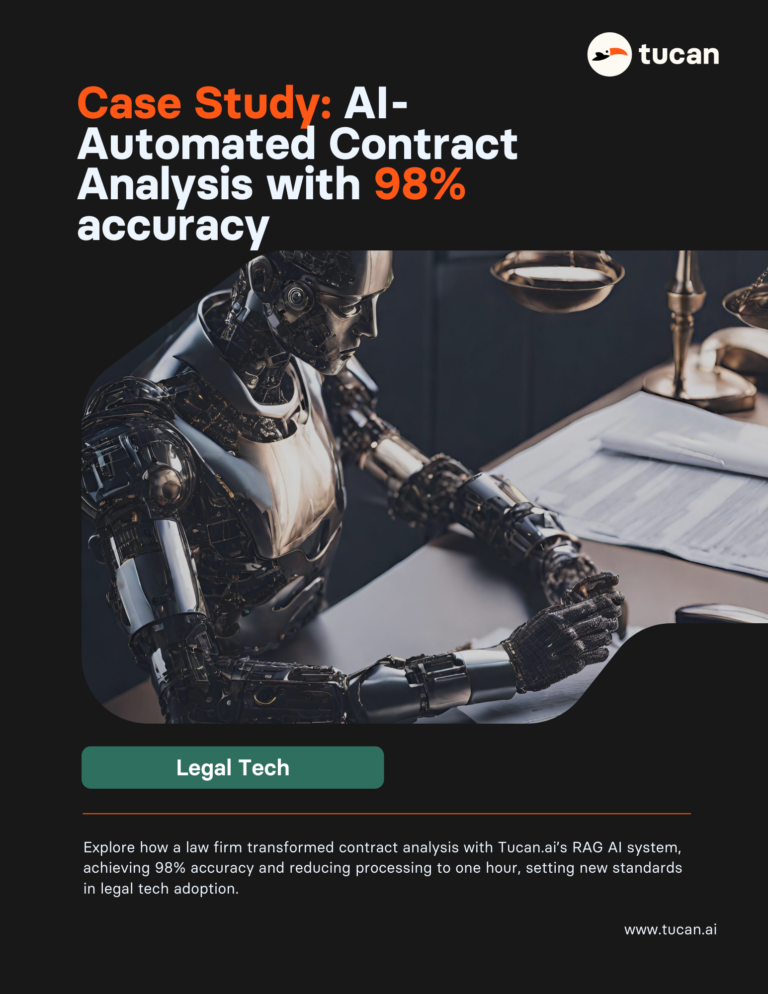
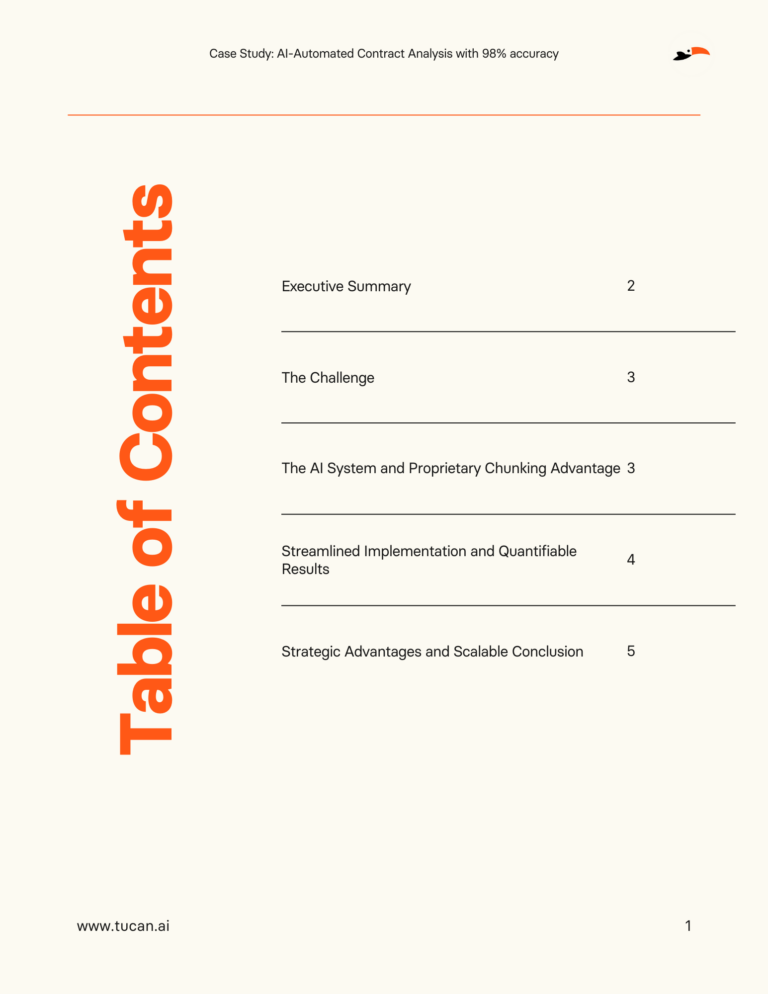
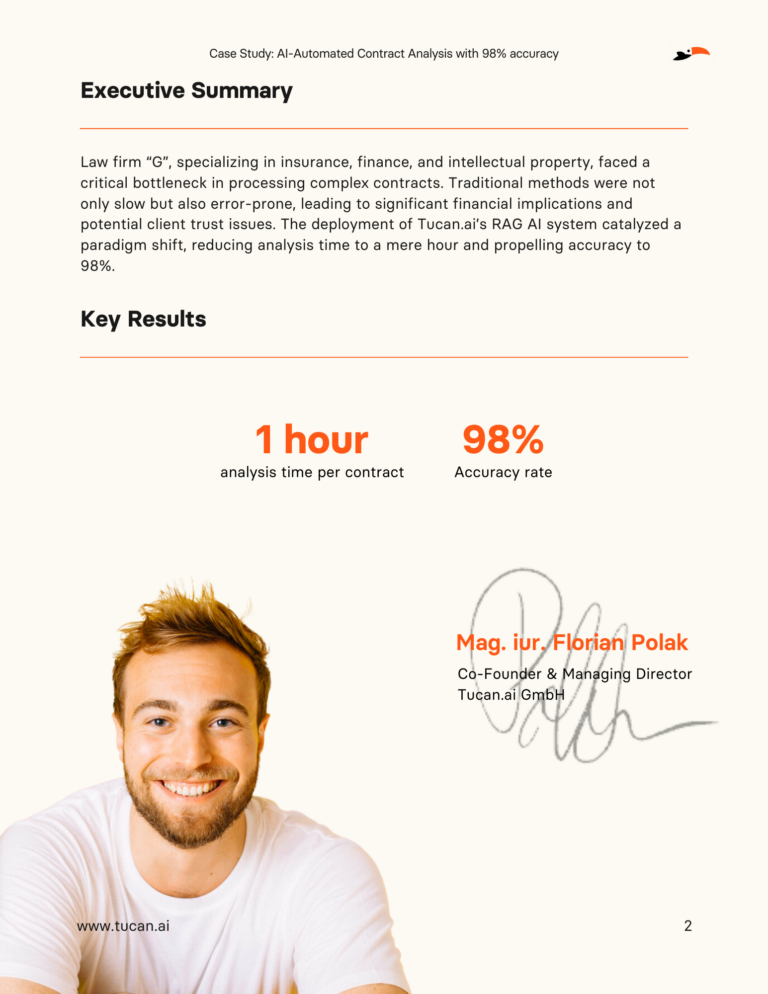
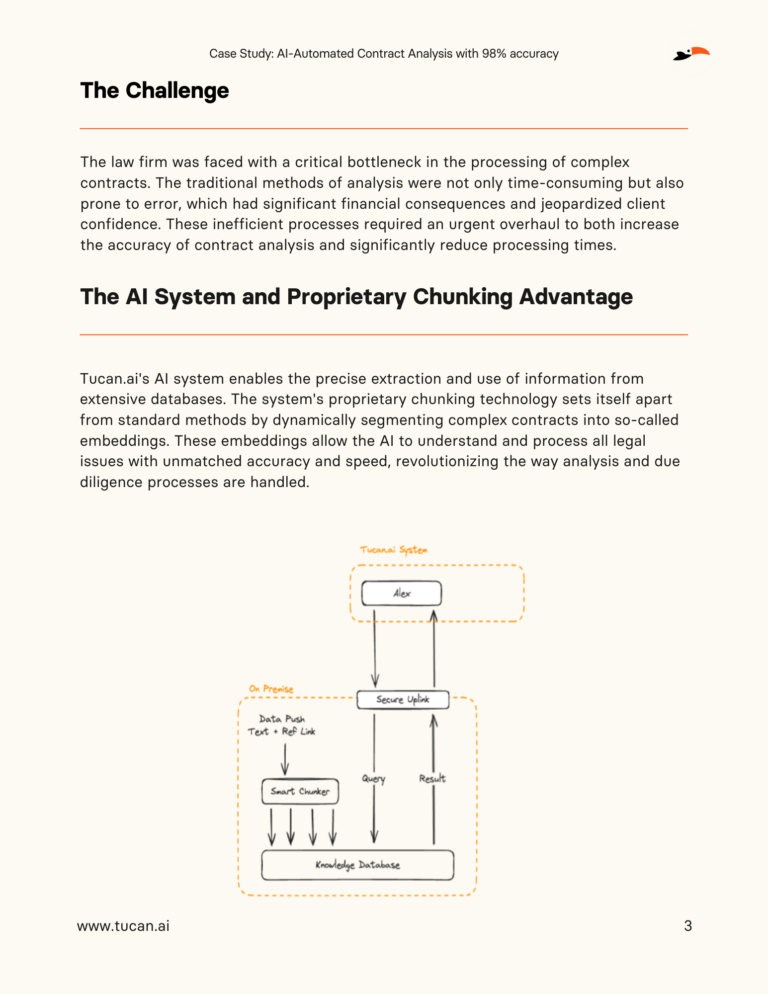
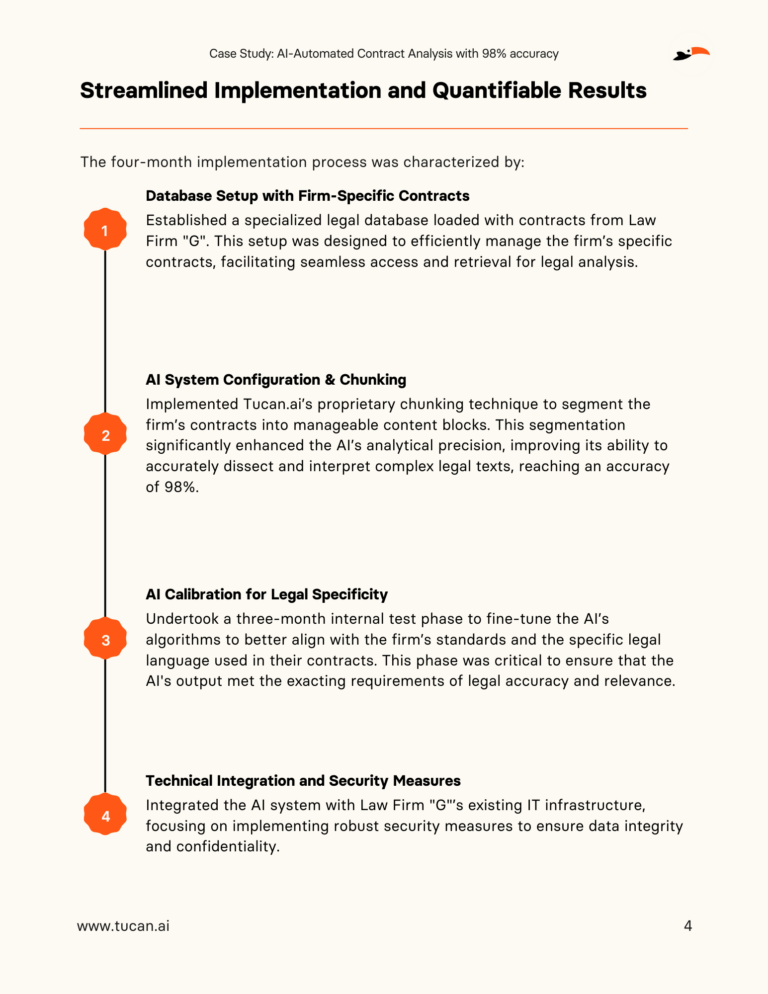
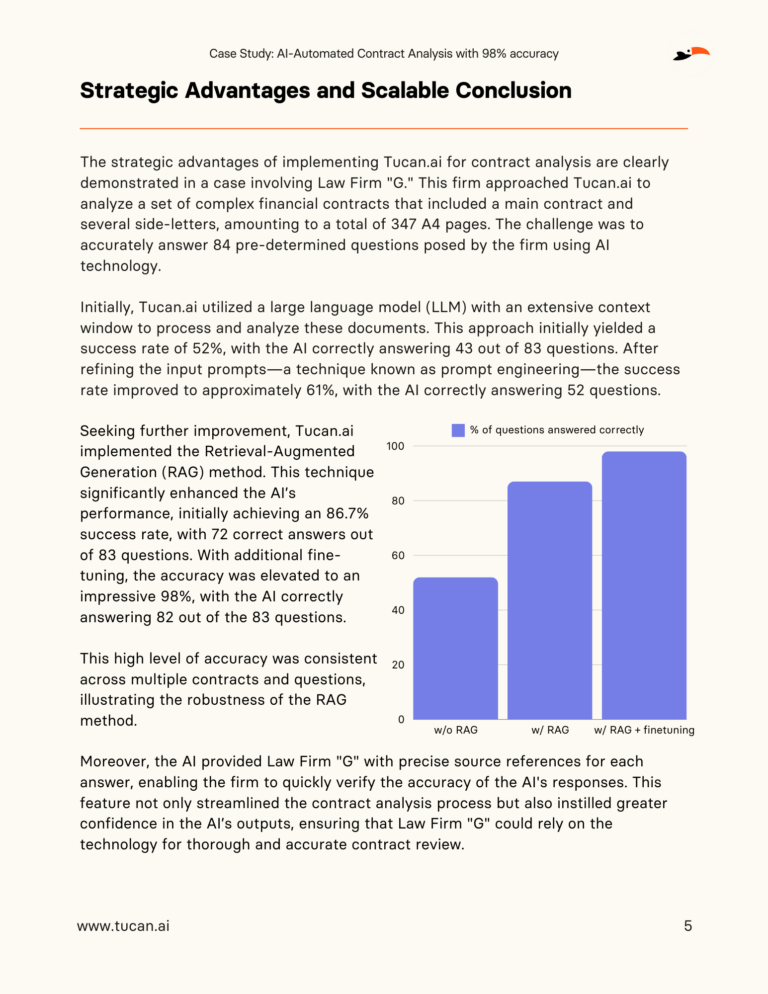
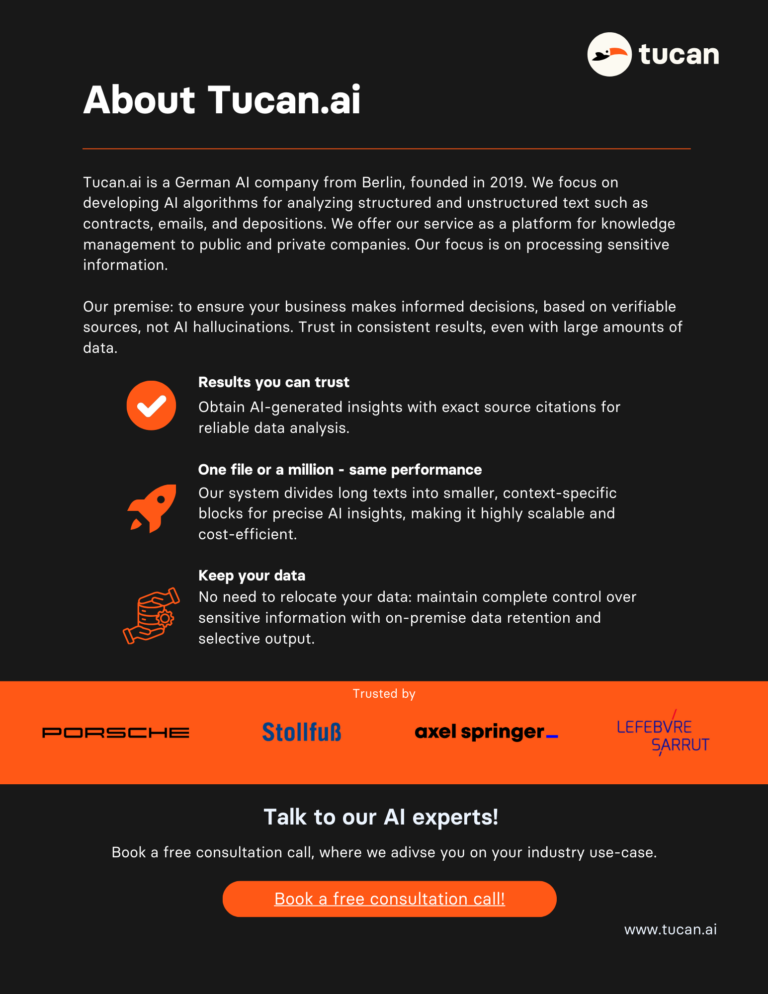
Key Results
This case study shows how the use of AI technology not only significantly increases efficiency in contract analysis, but also improves legal accuracy and shortens processing times:
- Dramatic acceleration: Reduce analysis time for complex contracts to just one hour.
- High accuracy: Thanks to the innovative chunking technique, the AI achieved an analysis accuracy of 98%, which strengthens confidence in the legal processes.
- Strategic improvements: Scalable results through the implementation of the RAG AI system, with consistency across multiple contracts and results with accurate source citations.
These innovations have not only simplified contract analysis, but have also strengthened the firm's strategic performance.
Download the case study for free!
We advise you on your use case!
What you need to consider when using AI for contract analysis and research work
Download the whitepaper for free!
The advent of Artificial Intelligence (AI) has ushered in a new era of efficiency and effectiveness in various industries, with the legal field being no exception. As the complexity of legal cases increases alongside the exponential growth of data, AI appears as a beacon of hope for streamlining operations, cutting costs, and enhancing the accuracy and quality of legal work. However, the integration of AI in legal contexts is not devoid of challenges. In our whitepaper, "What you need to consider when using AI for contract analysis and research work," we dive into these very issues, providing legal professionals with a digestible guide to the latest AI technologies apt for legal applications.
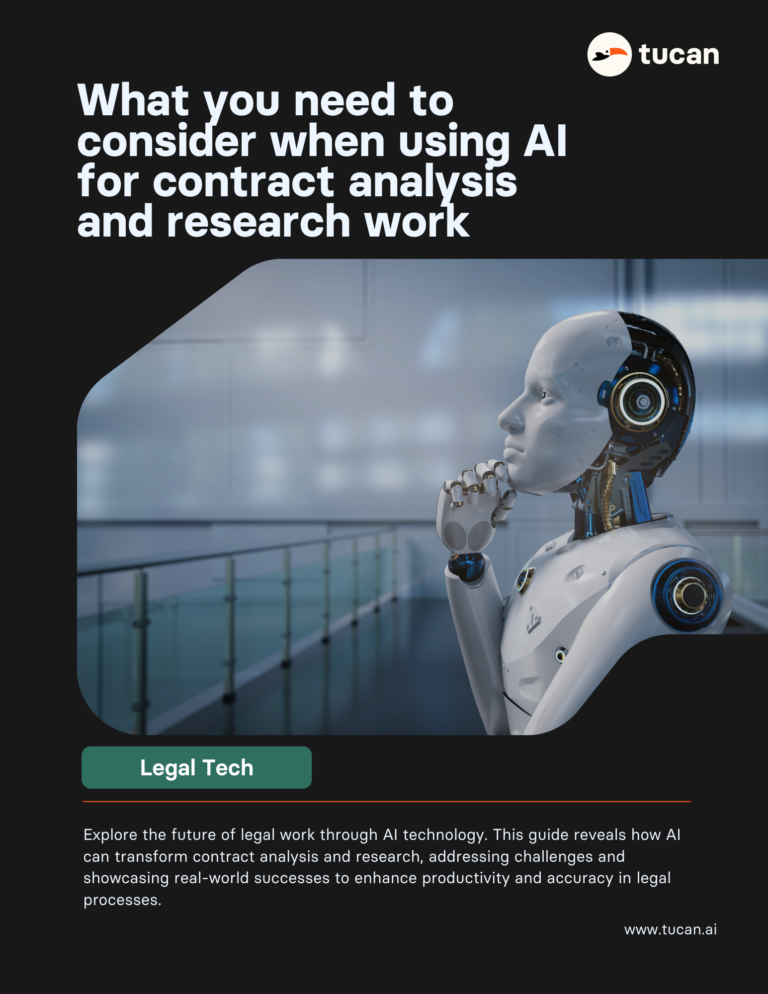
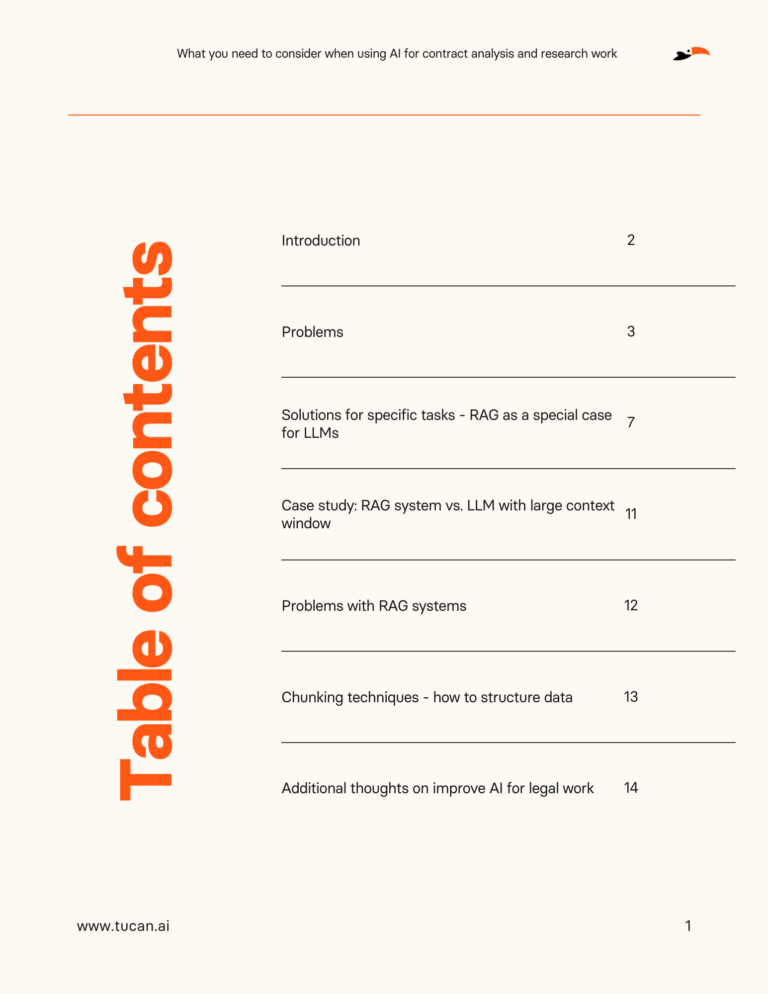

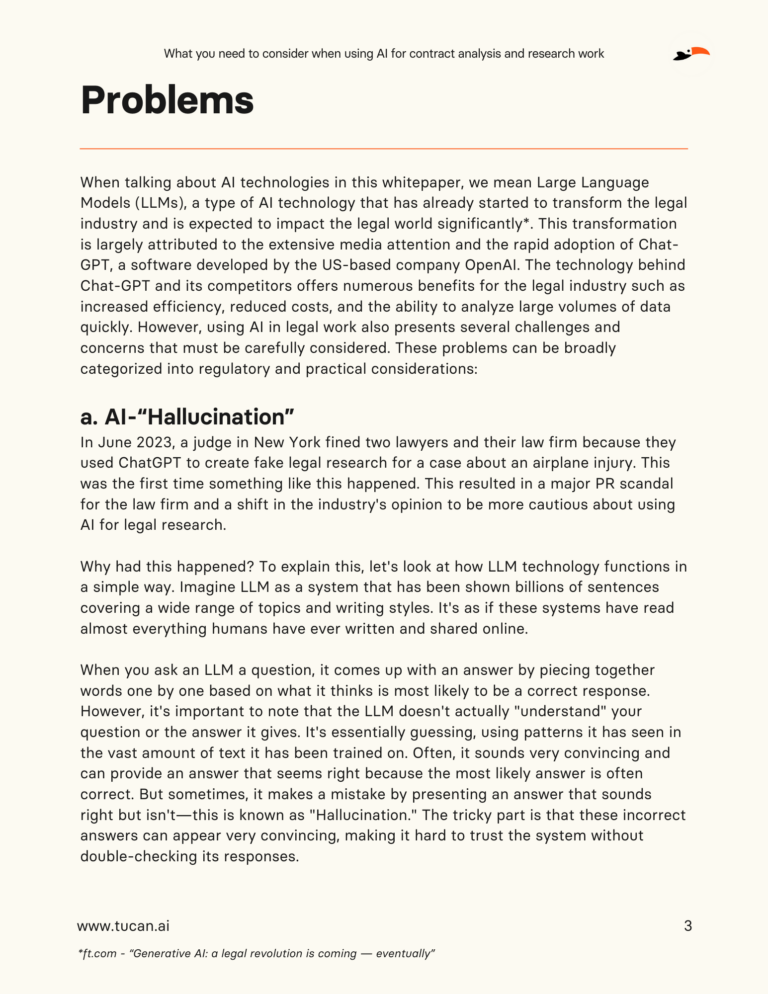
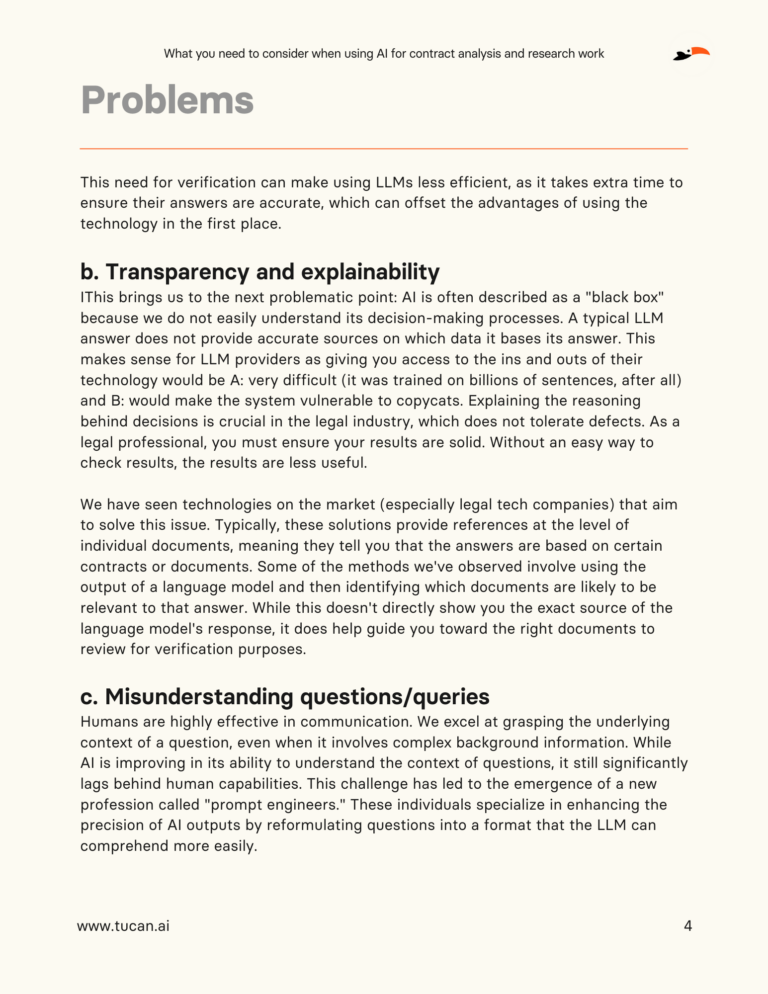
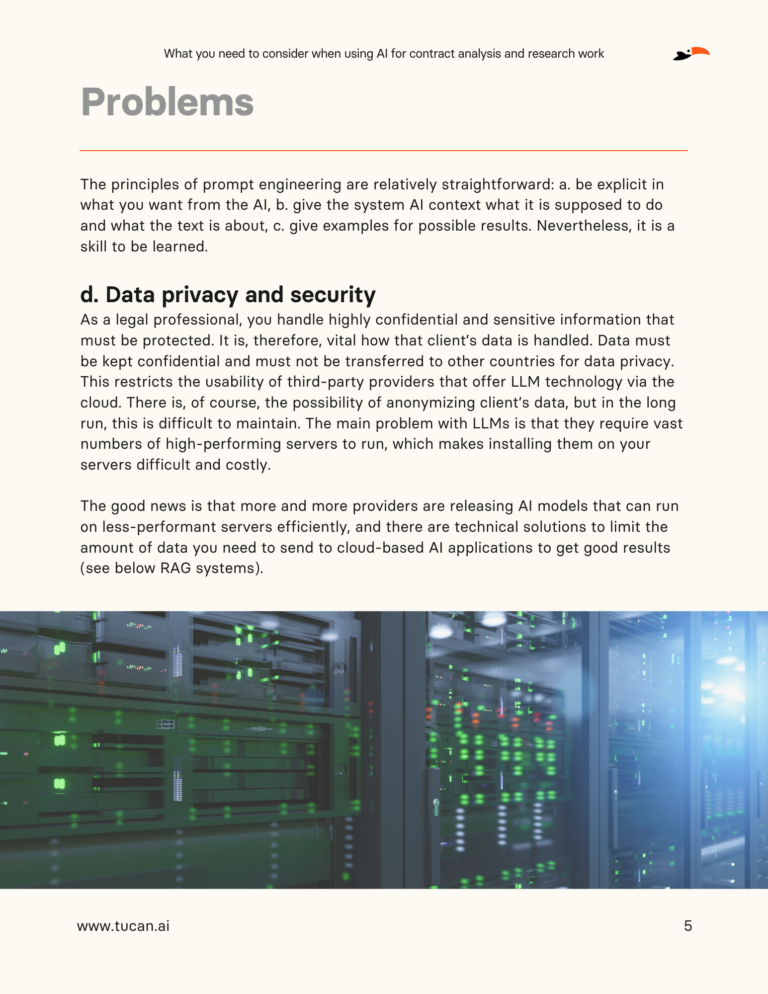
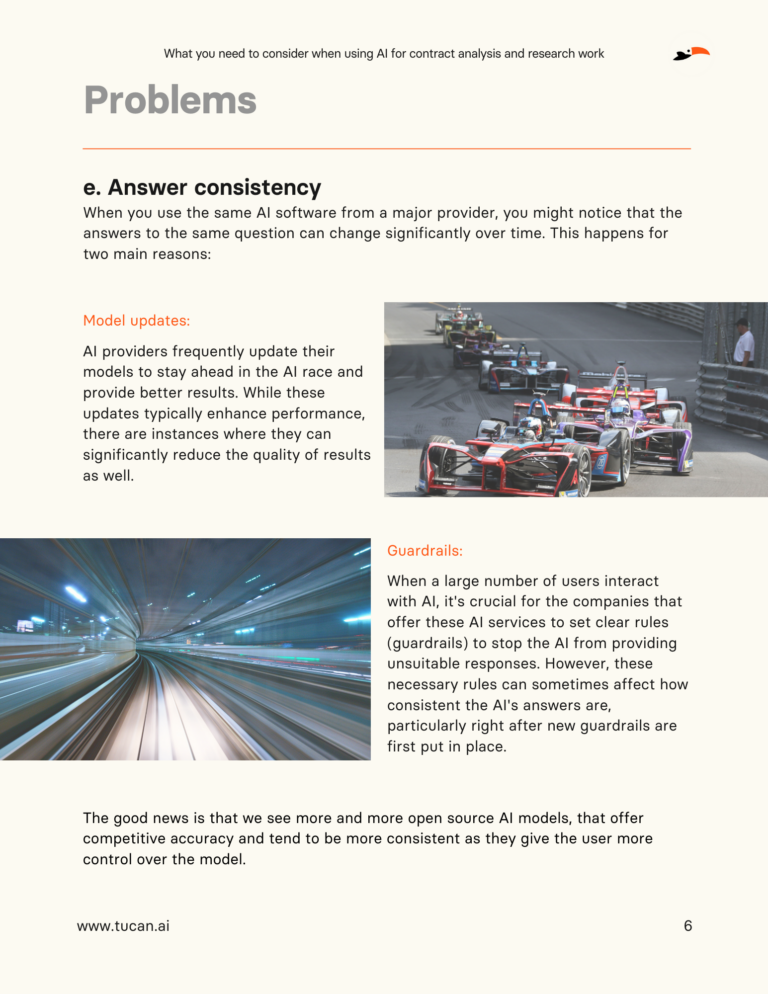
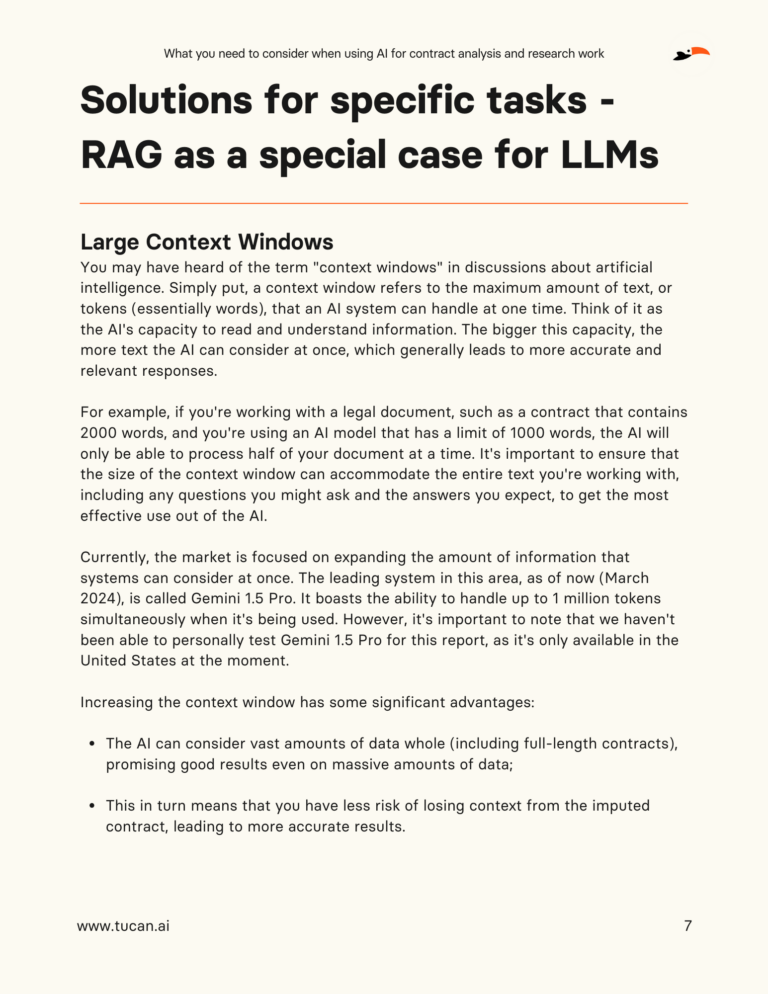
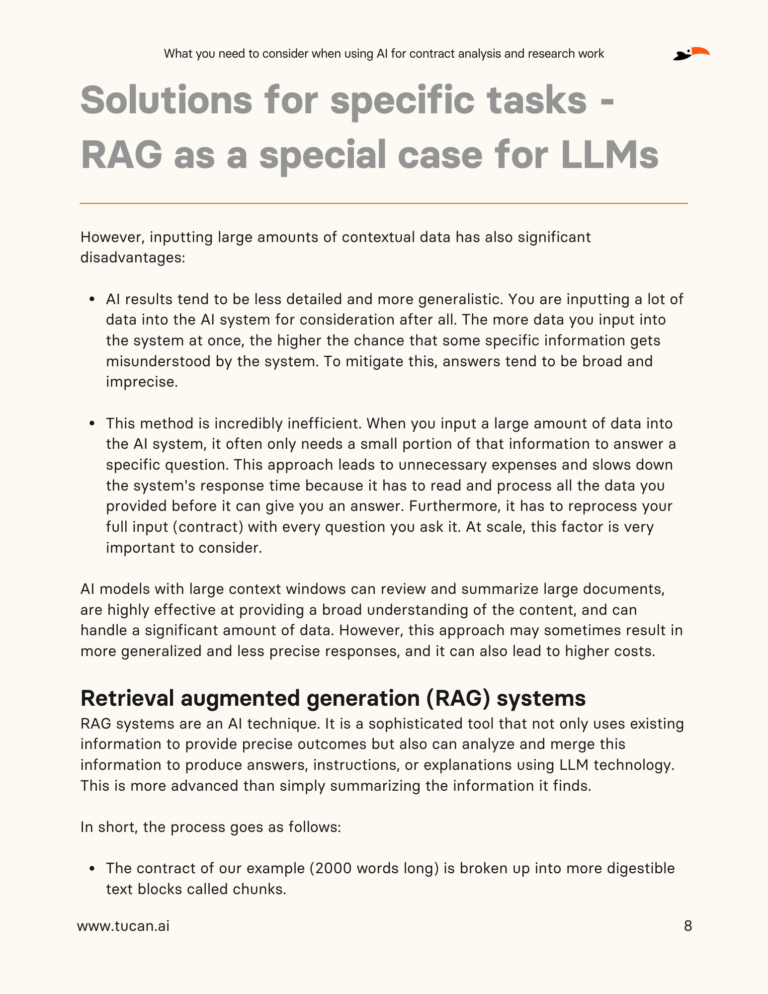
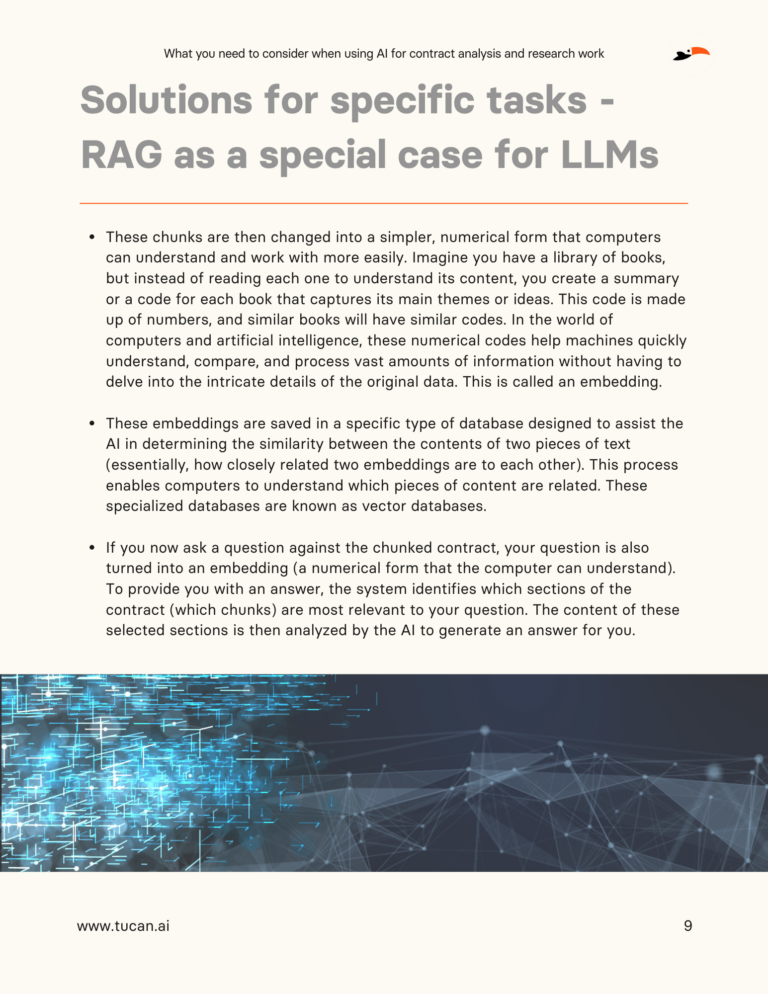
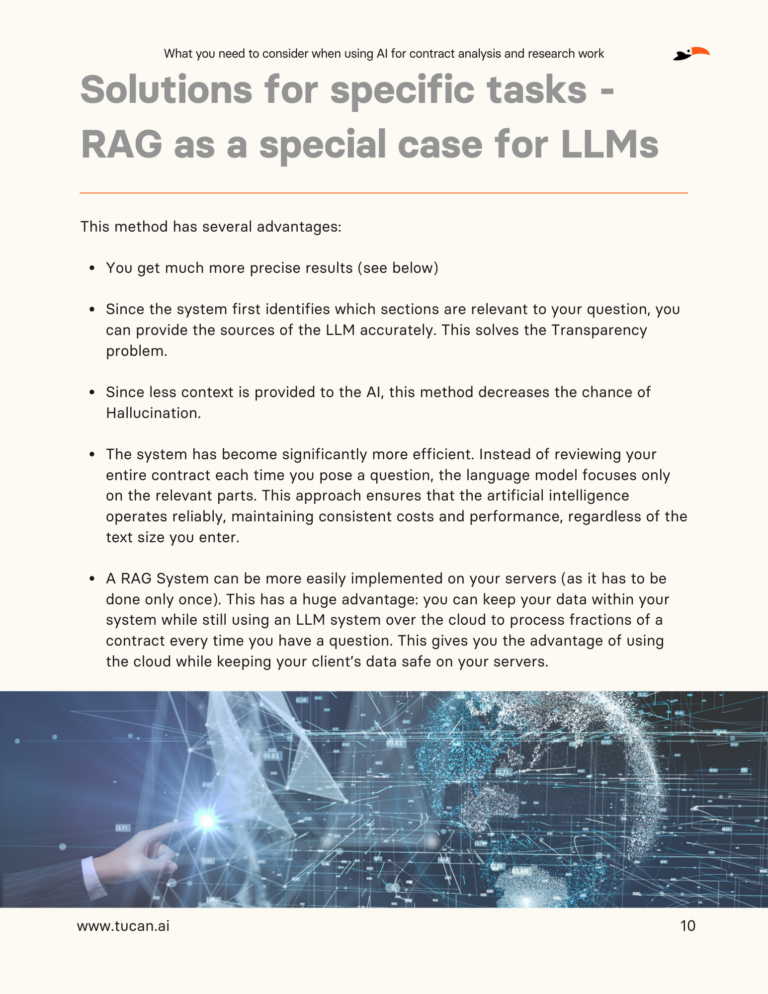
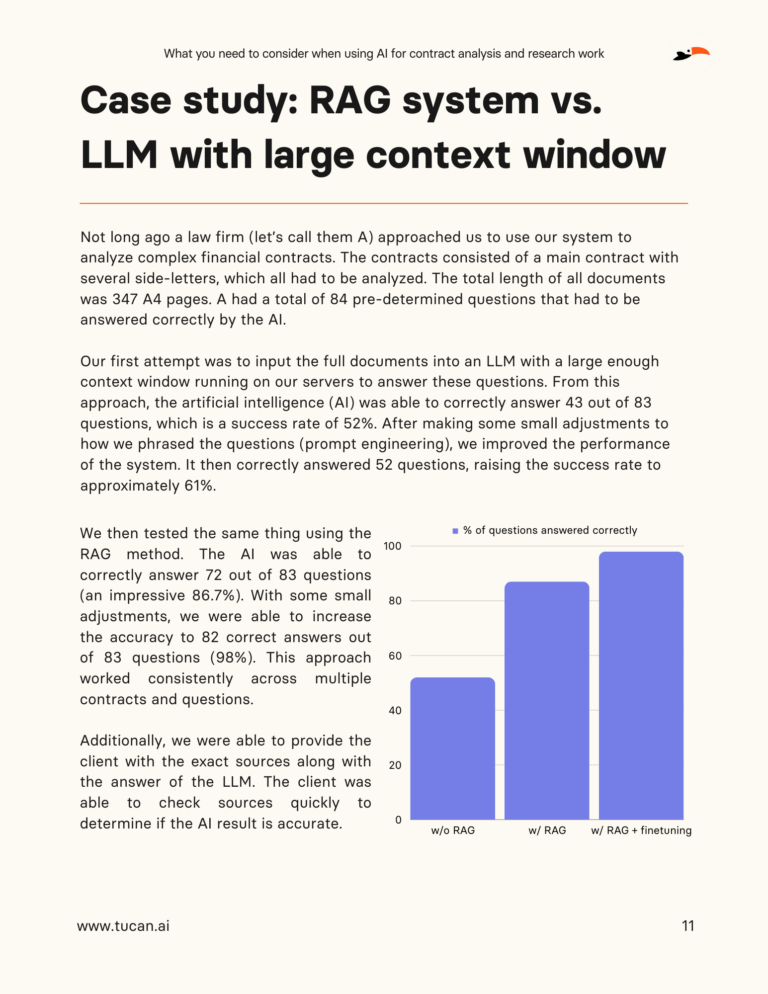
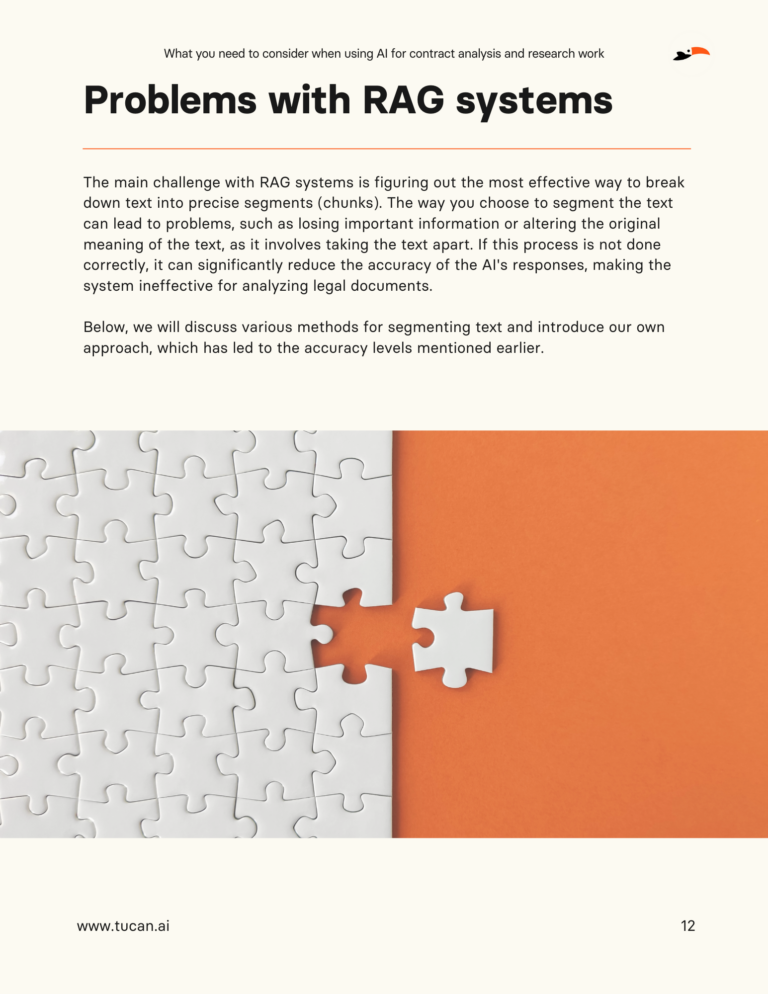
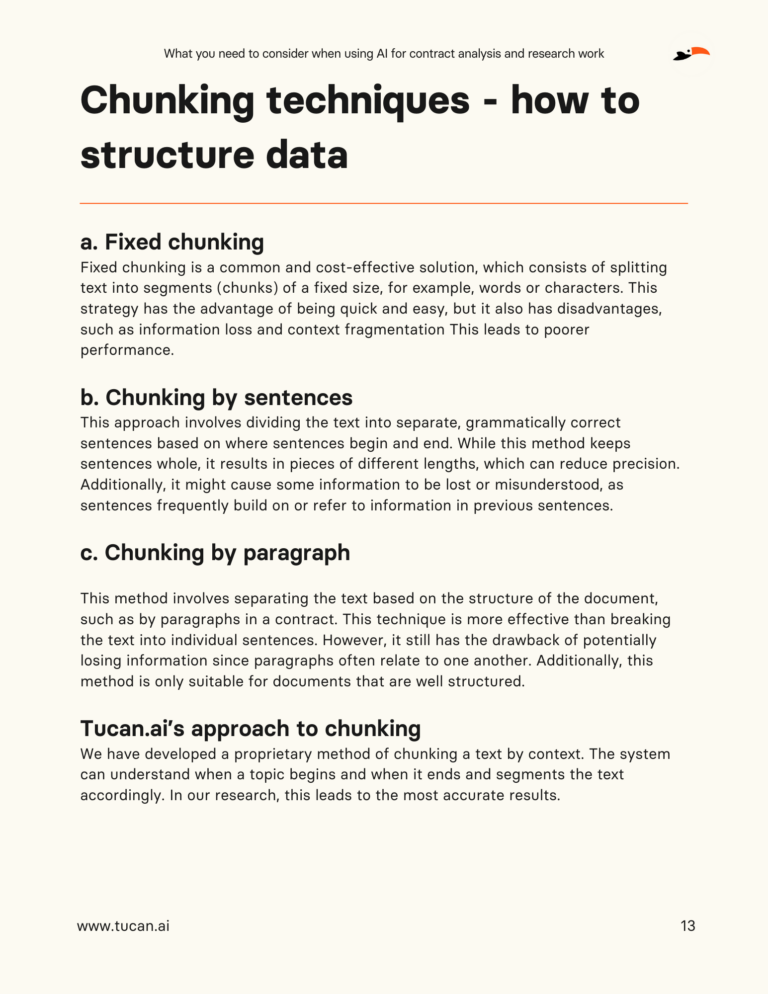
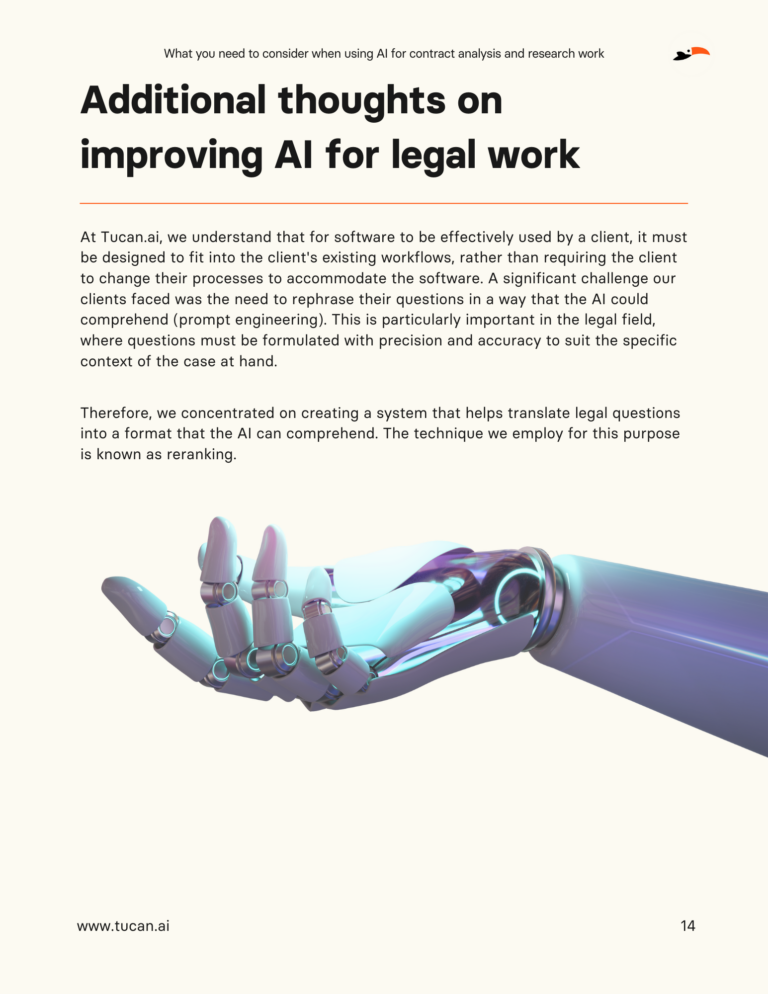
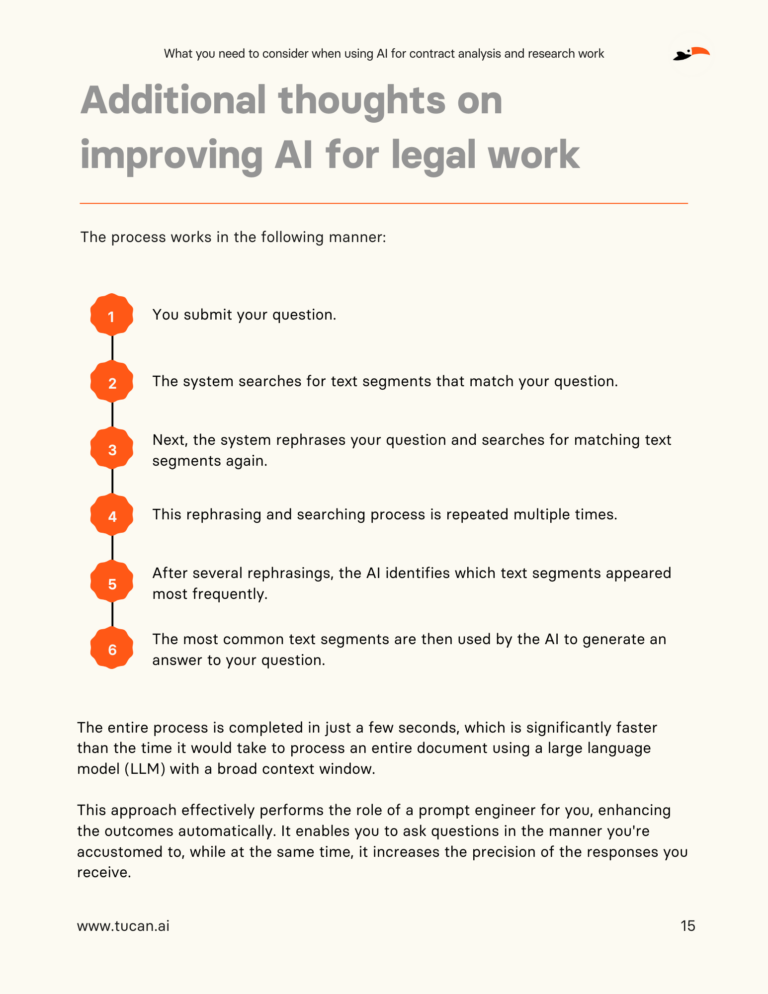
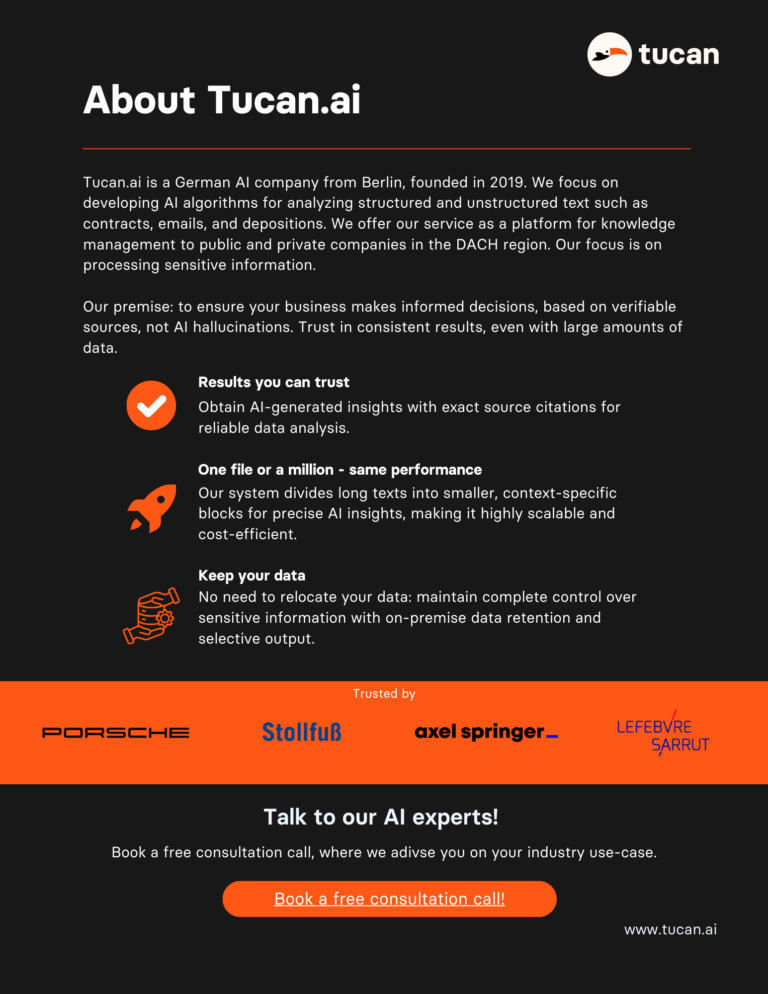
Core Challenges in AI Adoption for the Legal Industry
In the legal industry, the adoption of AI, particularly Large Language Models (LLMs), while transformative, faces significant challenges that hinder its seamless integration. The problem of "hallucinations," where AI produces convincing yet inaccurate answers, has led to serious repercussions, such as fines imposed on lawyers for utilizing ChatGPT for fictitious legal research. Moreover, the opaque nature of AI's decision-making, termed the "black box" issue, clashes with the legal sector's demand for transparency and reliability. Additionally, AI's struggle to comprehend complex human queries and the dependency on prompt engineering underscore its limitations in contextual understanding. The industry's stringent requirements for data privacy and security further complicate the utilization of cloud-based AI solutions. Finally, the evolving nature of AI models introduces issues of reliability and consistency, as responses to identical queries may vary over time. Together, these challenges underscore the critical need for a cautious and informed approach to leveraging AI in legal practices.
Download the whitepaper for free!
Innovations and Solutions
In the quest for advancing AI's application in the legal sector, notable innovations and solutions are emerging. The introduction of Retrieval Augmented Generation (RAG) systems marks a pivotal advancement, offering a method to deliver precise and accurate answers by breaking down extensive texts into manageable segments. This not only bolsters the accuracy of results but also addresses data privacy concerns by facilitating AI's operation on private servers. Furthermore, the development of novel chunking techniques, which segments texts based on context rather than fixed parameters, significantly enhances AI's capability in analyzing legal documents. Additionally, the automation of prompt engineering represents a breakthrough solution to the challenges of input precision. By developing systems that automatically translate regular legal queries into AI-comprehensible formats, there's a marked improvement in preserving the original intent of questions and enhancing the precision of outcomes. Together, these innovations promise a more effective and secure integration of AI in the legal industry, opening new avenues for its application.
In navigating the complex landscape of AI in the legal industry, understanding its benefits and pitfalls is paramount. Tucan's whitepaper serves as an essential compendium for legal professionals seeking to integrate AI into their practice thoughtfully and successfully.
Download the whitepaper for free!
We advise you on your industry use-case!
Seven Smart Software Tools Every Legal Team Should Use
In order to demonstrate your value to an organization, one of the things you should consider utilizing are smart tools – any machines, devices, or software that aid in completing electronic work. These tools help with efficiency, accuracy, cost savings, and collaboration. In other words, they make your team’s life much easier. In this post, we’ll cover seven of the best smart tools every legal team should use.
Practice Management Software
Legal professionals handle many operations on a day-to-day basis. These activities include time tracking, case management, and billing, just to mention a few.
However, because some of these activities are tedious and time-consuming, you should consider utilizing practice management software. They ensure that your business runs smoothly and critical information is stored safely.
Such software is designed to streamline and automate non-core tasks, including administrative tasks. Not only that, but these tools will allow you and other members of your legal team to focus on the core aspects of your legal firm.
For instance, a typical project management software will help you with case management, time tracking, billing, and invoicing. Clio, Smokeball, and CASEpeer are some of the best practice management software that the market has to offer.
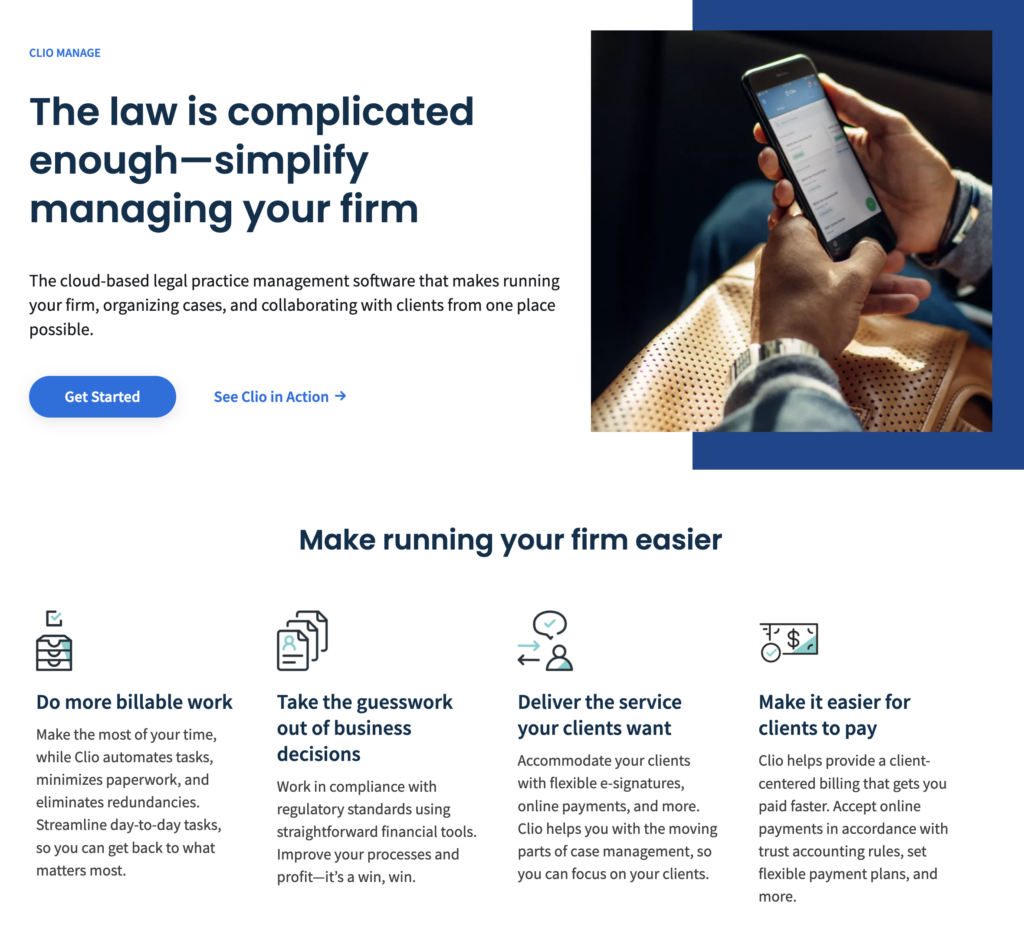
E-Discovery Tools
E-discovery tools are software applications and related tools that help legal professionals collect, process, review, and produce electronic data and other legal documents. They help prepare such documents for legal proceedings, audits, and investigations.
The majority of discovery is made electronically. Although using e-discovery tools will help you save time, you can also use tech tools for lawyers to streamline your discovery process.
Document Management and Automation Software
As their names suggest, these tools help legal teams automate, organize, store, and manage documents related to their cases, clients, and other legal proceedings. They can perform a wide range of tasks, including automating the document creation process, reducing manual data entry, and ensuring the safety of stored documents. Having access to reputable document management and automation software can help streamline workflow, increase productivity and reduce errors. Other common features of these tools include document indexing, version control, collaboration features, and advanced search capabilities. Tucan.ai is one of the best automation tools when it comes to transcribing and summarising conversations with a lot of legal jargon. It helps you document and analyse your calls, meetings and hearings, as well as with repetitive tasks such as data entry and text coding, allowing you to shift your focus on what is actually important at work.
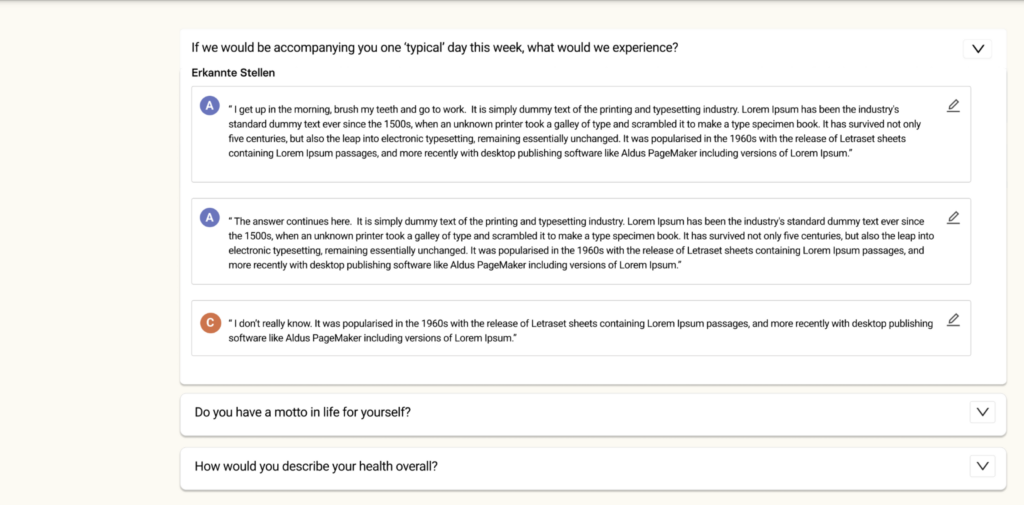
Data Security and Privacy Tools
It’s widespread standard for legal teams to deal with sensitive and confidential information daily. Such information includes confidential client info, financial information, and other sensitive legal documents.
Legal teams are responsible for safeguarding this information and ensuring it doesn't end up in the hands of unauthorized personnel. The most common and widely used data security and privacy tools include data encryption, backup, recovery, password managers and access control tools.
Antivirus software is another security tool you should consider adding to your arsenal. The best antivirus software helps legal teams maintain data security and privacy by protecting their systems from malware, viruses, and other cyber threats. These threats not only compromise sensitive data but can also harm your system's performance and functionality.
You want to test Tucan.ai for your Company?
Book a free consultation call!
E-Signature Tools
Any legal operation has to involve e-signature software. Such tools are essential for any legal team as they speed up contract conversion while bringing security and transparency to the company’s operations.
E-signature tools are also convenient. They allow you to sign documents from anywhere, at any time, with an internet connection. This means you don't have to be physically present to sign important documents. This can save you a lot of time and hassle. Some of the best digital signature apps for law firms include Docusign, Clio, MyCase, PandaDoc, and SignNow.
Contract Management Software
Contract management systems give legal teams the ability to focus on high-value and more strategic work. Contract management software lets you store all your contracts in one centralized location.
PandaDoc, DocuSign, and Concord are some of the best contract management software with features like centralized storage, automated reminders, and performance monitoring. Besides, you’ll save more on time and resources as tedious administrative tasks tend to be time-consuming.
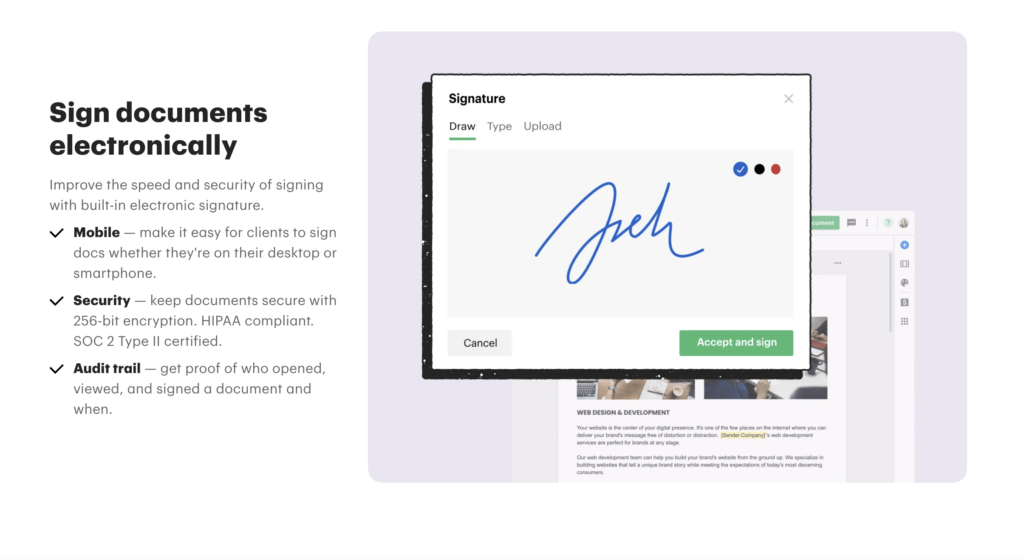
Legal Analytic Tools
Legal analytic tools are applications designed to help law firms gather, analyze, and interpret information relating to legal cases, and clients. Although they help with information interpretation, these tools are becoming increasingly important for law firms looking to streamline their marketing efforts and improve client satisfaction.
Law firms can gain a better understanding of their target audience and tailor their marketing campaigns accordingly. They can also use the information from analytics to track client satisfaction levels, allowing them to identify areas where they can improve their services and enhance the overall client experience.
Conclusion
Today’s fast-paced legal sector has pushed legal teams to work more effectively and efficiently than ever before. Advancements in tech have made it possible for the same teams to automate many of their routine tasks while streamlining their workflow.
Smart tools have emerged as game-changers for legal teams. Every legal team should use smart tools, including practice management software, legal analytic tools, e-signature tools, document management/ automation software, e-discovery tools, and collaboration and communication tools.
You want to test Tucan.ai for your Company?
Book a free consultation call!
Conversational intelligence for legal professionals: Use cases and solutions
As AI becomes more prevalent in the legal industry, lawyers, attorneys, and paralegals delegate more work to smart computers that improve as they are using them. For instance, the co-founder of the Harvard Journal of Law & Technology Lauri Donahue reports that legal professionals make increasing use of AI tools for reviewing documents, analysing contracts, researching as well as predicting outcomes.
In this article, we’ll detail how AI, specifically conversational intelligence, is transforming law firms and give examples of the common tools firms are employing today. First, however, let’s back up and take a look at the booming field of computational linguistics and conversational intelligence.

The market for AI and computational linguistics is booming
The market size for artificial intelligence was $87 billion (USD) in 2021. By 2030, it will be $1.6 trillion. That’s an 18x increase. Likewise, a subset of AI, computational linguistics, is set to grow from 21 billion in 2021 to 127 billion in 2028.
The market size is exploding, because organisations see the strong business case for AI tools. And they’re leveraging it both externally in the market and internally, in their workforce. There is a strong demand for AI tools, but they’re still often misunderstood. Saying, “our software uses AI,” is pretty vague. To paint a clearer picture, let’s define a key subset of AI, conversational intelligence and practical uses for it today.
How can conversational intelligence be applied effectively?
Conversational intelligence refers to the tools that leverage AI to speak with users or customers. Commonly chatbots or virtual assistants, these tools pull large volumes of data and run it through machine learning and natural language processing to speak in a natural way like a human.
Conversational intelligence is a branch of computational linguistics, the study “of language from a computational perspective.” Simply put, it’s determining how to make it easier for humans to communicate with computers, primarily through spoken word, but also written communication.
TechTarget explains that the knowledge underpinning computational linguistics powers tools “like instant machine translation, speech recognition systems, text-to-speech synthesizers, interactive voice response systems, search engines, text editors and language instruction materials.”
You want to test Tucan.ai for your Company?
Book a free consultation call!
Use cases for conversational intelligence in law offices
Now let’s turn to explore use cases for computational linguistics and conversational intelligence within law firms. Below, we outline three important ways that law firms today (and many in the future) will use AI.
Automated documentation
Legal documentation, whether internal notes or transcripts of court proceedings, is often done differently depending on the person or court. Using AI, law firms are speeding up the laborious process of manually entering data.
With AI, law firms can analyse large amounts of unstructured documentation notes and organise them into standardised templates. This not only saves a tremendous amount of time, but also reduces the risk of manual errors.
The AI can do this by using natural language processing methods that encode conversational content, whether speech-to-text and text-to-text, and understand its meaning. Language models today are powerful enough to comprehend both the intent and the substance of a message and organise it accordingly.
Chatbots
Just like many businesses with websites, visitors have specific questions they want answered and they want answers fast. They don’t want to click through a dozen pages to find their answer. Instead, they want a portal to connect with client service.
But meeting this need is challenging for lawyers and their offices. If they have hundreds of visitors a day, do they need a fleet of service reps ready to answer incoming questions? For law firms specifically, do they need experienced associates online to provide expert advice? Not exactly.
Chatbots are another growing use case within law firms. TimeSolv describes chatbots as “computer programs designed to deliver an interactive customer experience without actual human interaction.”
Law firms can use chatbots to quickly answer questions that visitors have. And beyond simple questions or instruction, AI chatbots within law firms can answer common legal questions with accuracy and point visitors toward the right attorneys or resources if needed. Finally, chatbots can be a powerful way to advance communications with clients.
Automatic contract drafting and review
This third use case, having AI draft legal contracts and review them, is still in its nascent stage, but has a lot of potential. Today, we don’t have AI platforms automatically generating legal contracts or recommendations, but they do assist lawyers by surfacing the most relevant resources, like precedent cases for lawsuits, as an example.
In the same way that AI tools can help associates categorise documents or notes into templates, they can also fill in template legal contracts. Lawyers fill out a questionnaire that encodes the data, pairs it with other relevant resources, and creates a strong first draft. This can drastically speed up the process. The limitations, however, are with personalisation. Right now, lawyers can’t easily adjust the code that creates these drafts so that it’s tailored to their clients’ needs. But as AI rapidly grows, this may be a capability AI technology quickly achieves.
You want to test Tucan.ai for your Company?
Book a free consultation call!
AI tools that are particularly useful for law offices
Now that we’ve looked at three use cases, you may want to actually get started yourself. To do so, we list three tools below that law firms can and are using today.
OneLaw
OneLaw is an AI assistant designed for law firms. Their AI assistant, called Amelia, functions as a multi-channel, “meaning she can speak, text, email, and chat” with clients. Law firms are already using Amelia to scale their levels of client relations without sacrificing quality.
Amelia can help nurture leads by pointing them towards the information or support they need. Likewise, it’s online 24/7 and on every communication channel, so no potential customers fall through the cracks. Amelia speaks over 40 languages, and is recognised “as the Most Human AI™ agent with leading conversational abilities”, according to their website.
Lawgeex
Lawgeex is an AI tool that validates contracts to ensure they are within predefined policies and makes suggestions for editing if they fail to meet the firm’s standards. Lawgeex understands the context of your position and analyses your policies to make the most accurate recommendations and relevant redlines.
The biggest benefit for law firms using Lawgeex is how it increases their speed. They claim to “act as an extension of your legal team, giving you more consistent contract review in a fraction of the time.” They also compile your firm's positions, risks and guidelines into digital legal playbooks so that each contract is reviewed the way an internal attorney would.
Tucan.ai
Tucan.ai is like your astute and quiet stenographer who is with you at every meeting, documents your conversations and archives them smartly. It transcribes and summarises all the calls or meetings you have throughout each day. Except, instead of being a full time executive assistant, they’re an AI platform.
Tucan.ai makes your conversations more actionable by extracting certain information and pulling out the most relevant insights as a summary. Likewise, it flags and reminds you of any follow-ups so nothing is missed.
When different associates at your firm are meeting with clients in person, over conference calls, and via email, tasks and important information can fall through the cracks. Tucan.ai runs in the background capturing the most pertinent information. Whether via bot or download, everything can be automatically transcribed, so if you need to go over a conversation later, it’s easy.
You want to test Tucan.ai for your Company?
Book a free consultation call!
Optimising workflows with AI-powered conversational intel
In this article, we’ve made the case that law firms need to recognise the transformative impact that AI applications will have within their industries. Indeed, these changes are already underway.
For law firms to remain up to date and competitive, it’s time to innovate, push for change within their operations, and start testing different AI tools. These tools can give them an edge over their competition and streamline traditionally manual approaches.
The three tools outlined in this article, OneLaw, Lawgeex, and Tucan are great opportunities to break into the other three use cases we outlined in this article. They’ll help you streamline how you service clients, draft contracts, and complete discovery. We recommend: Get started now!



